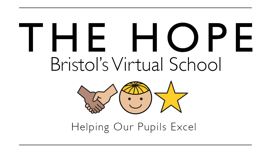The HOPE, Bristol's Virtual School, exists to promote the education of children in care and those who have been in care (looked after children and previously looked after children).
The HOPE is for children and young people who are in the care of or a care leaver of Bristol and either educated in Bristol or by another local authority.
We support children aged 2 to 18. We also continue to offer advice and guidance to young people aged 18 to 25, who have been in care, if they:
- are still in education
- have an active Education, Health and Care Plan and need support to access education
The HOPE doesn't have its own school building. We have a staff team that supports young people, their carers and other adults that work with them. Our pupils go to real schools or education settings and access their learning there. We work with the staff in those settings so we can monitor and track how well our young people are doing.
We also have information and advice about previously looked after children.
Our vision is in The HOPE's logo: Helping our Pupils Excel.
Our three core values are:
- aspiration
- collaboration
- respect
Many children and young people in care do well at school. However, as a group, children in care don't do as well in their education as other children.
Every local authority in England has a statutory duty to promote the educational achievement of these children. We do this through our virtual school.
We act as part of the corporate parenting structure for Bristol's children in care and those who were in care. This means we:
- encourage them to let us know how they're feeling about their education
- use their feedback to help make the best decisions for them
- help them receive support to ensure they make good progress in their education
- help them access services provided by us and other organisations
- prepare them for adulthood and further education, training or employment
We check how Bristol's children in care and those who have been in care are doing in their education by meeting and working with:
- our young people
- their schools and education settings
- their social care staff
- their carers
This helps us to understand the young person's experience of education and the progress they're making. We then work with the people supporting the young person, to make sure the support is in place to help them achieve their potential in education.
We work with other local authorities and other council departments.
Other local authorities
We work with other local authorities to find and provide advice and guidance when either:
- Bristol children in care move to another local authority
- children in care with another local authority move into Bristol
This might include advice on finding appropriate education provision and key contacts within the authority.
Other departments in the council
We work with other council departments including:
- Alternative Learning Provision
- Attendance and Education Welfare Service
- Governor Development Service
- Educational Psychology Service
- School Admissions Service
- School Improvement Officers
- Special educational needs and disabilities
- Safeguarding in Education team
Other organisations we work with
- independent fostering agencies
- the NHS
- not for profit organisations such as the National Citizen Service
- nurses for looked after children
- training or apprenticeship providers for our post 16 young people
You can contact The HOPE's headteacher if you have a question about systems or policies to do with the education of a child in care.
Contact the relevant staff member if you're looking for individual advice or support for a pupil.
We follow government guidance to help promote the education of children in care Go to https://assets.publishing.service.gov.uk/government/uploads/system/uploads/attachment_data/file/683556/Promoting_the_education_of_looked-after_children_and_previously_looked-after_children.pdf (opens new window).
The guidance sets out what we must do and what we expect other professionals working with us to do.
We also follow government guidance for organisations which work with and support children and young people who have special educational needs or disabilities Go to https://assets.publishing.service.gov.uk/government/uploads/system/uploads/attachment_data/file/398815/SEND_Code_of_Practice_January_2015.pdf (opens new window).
